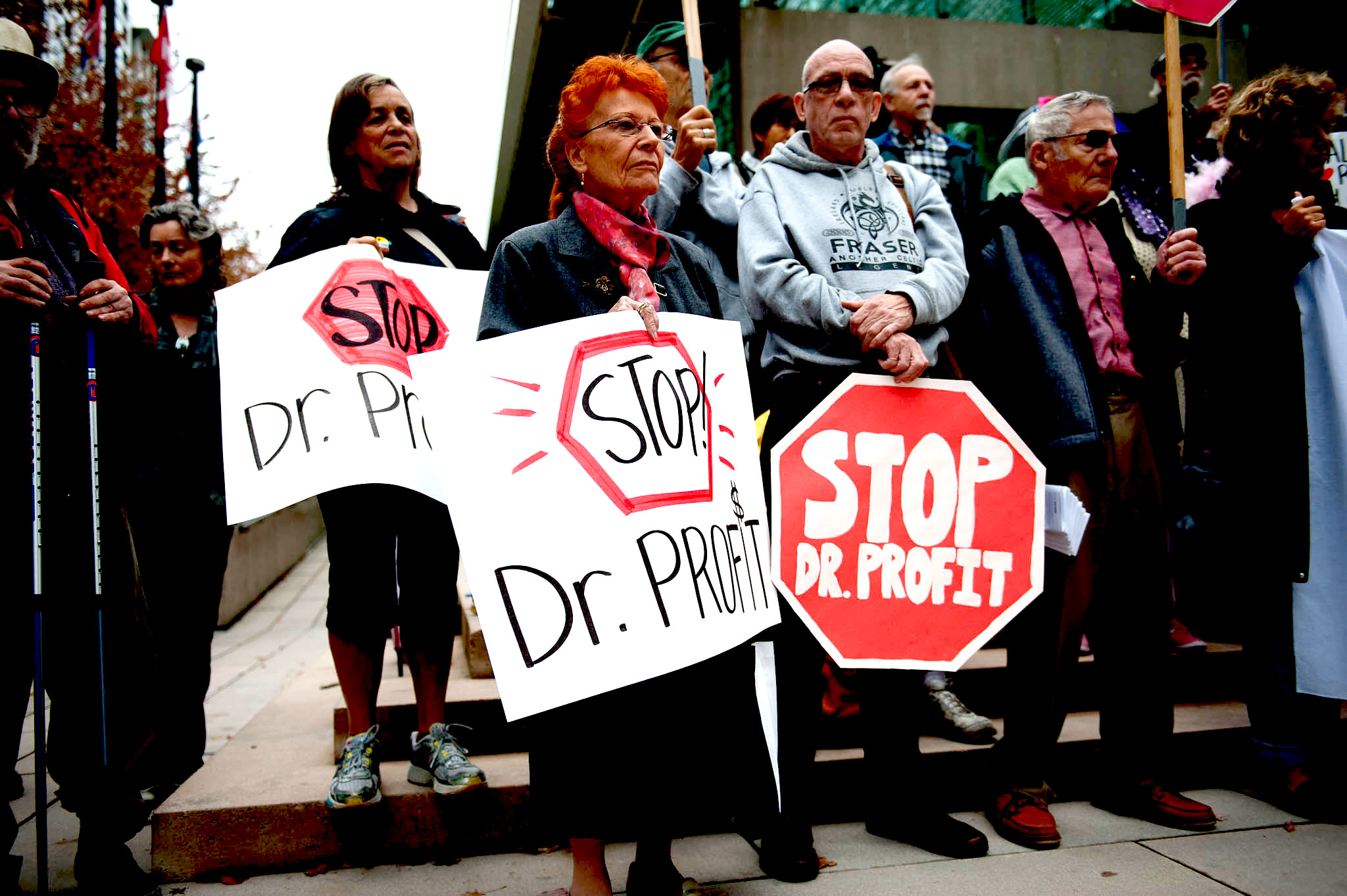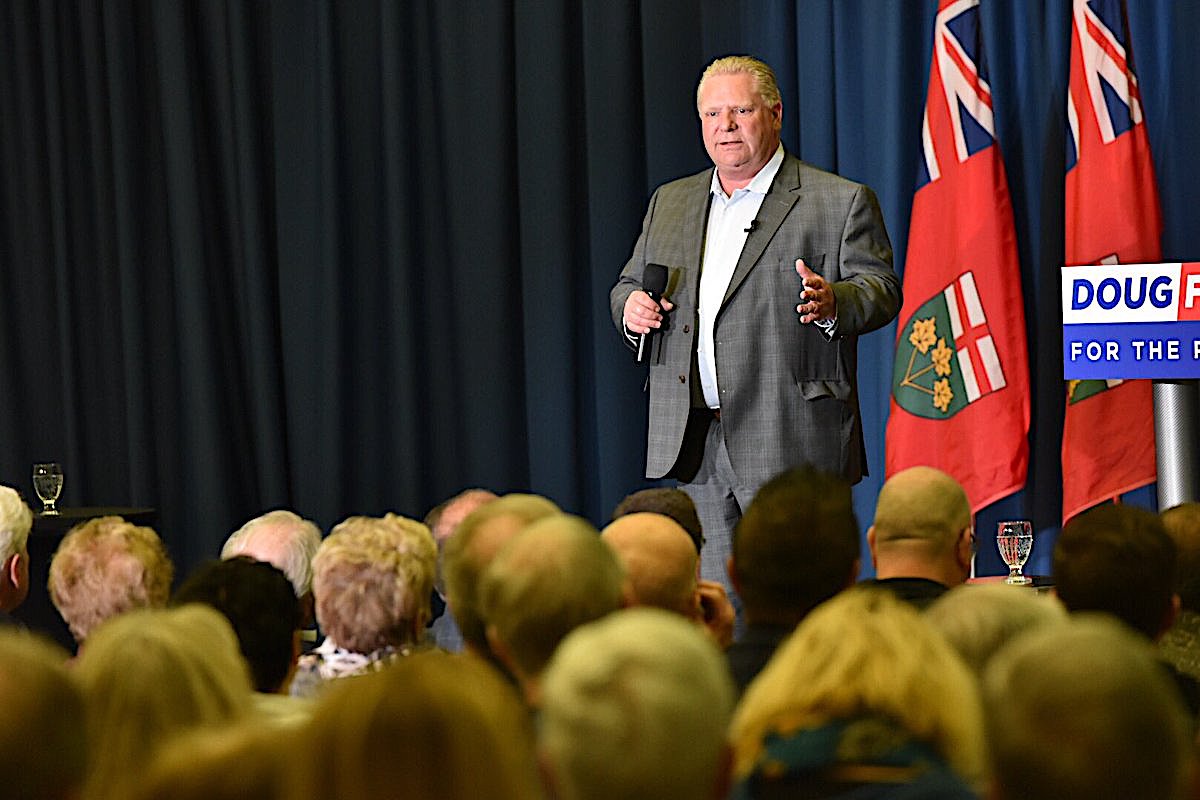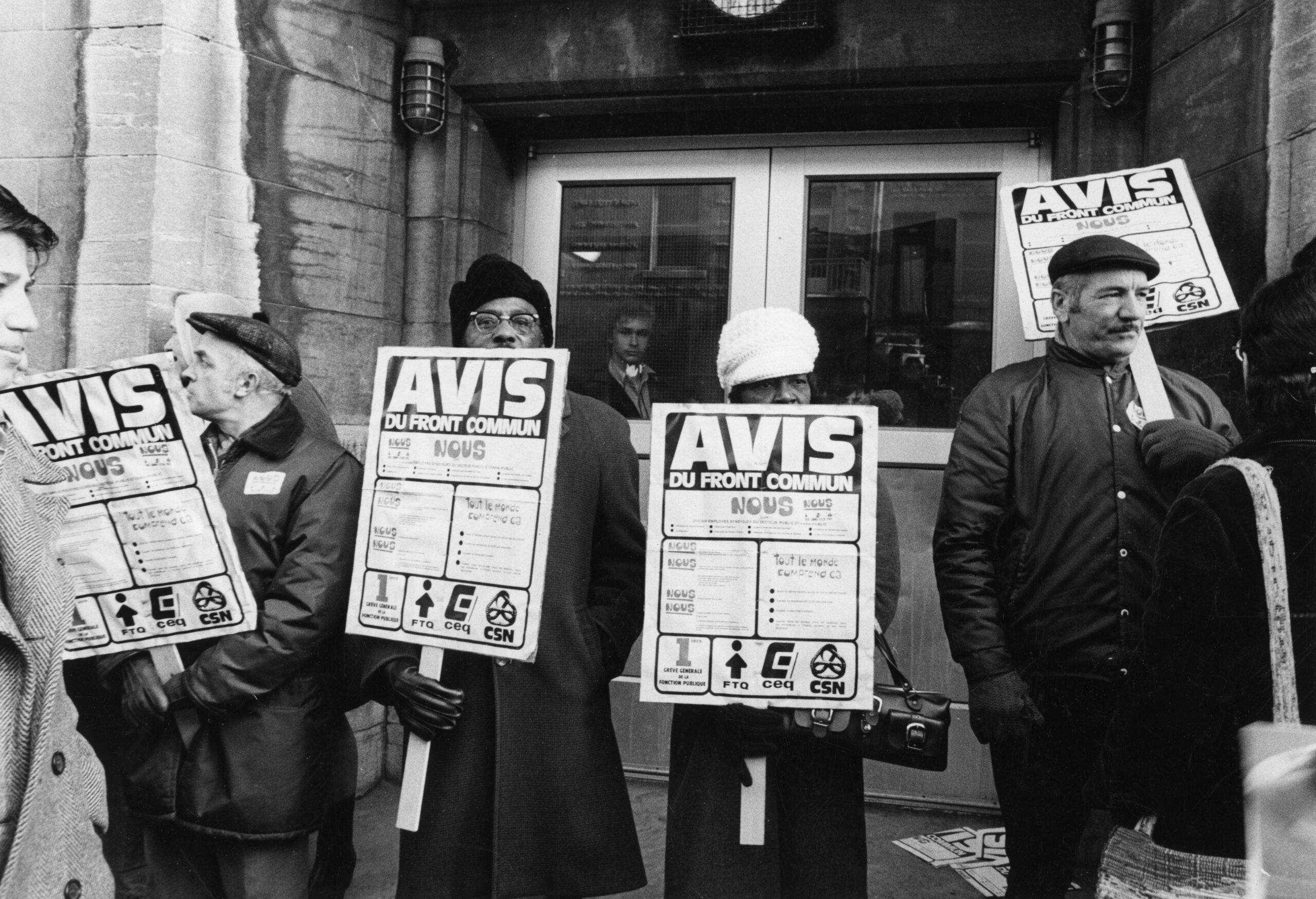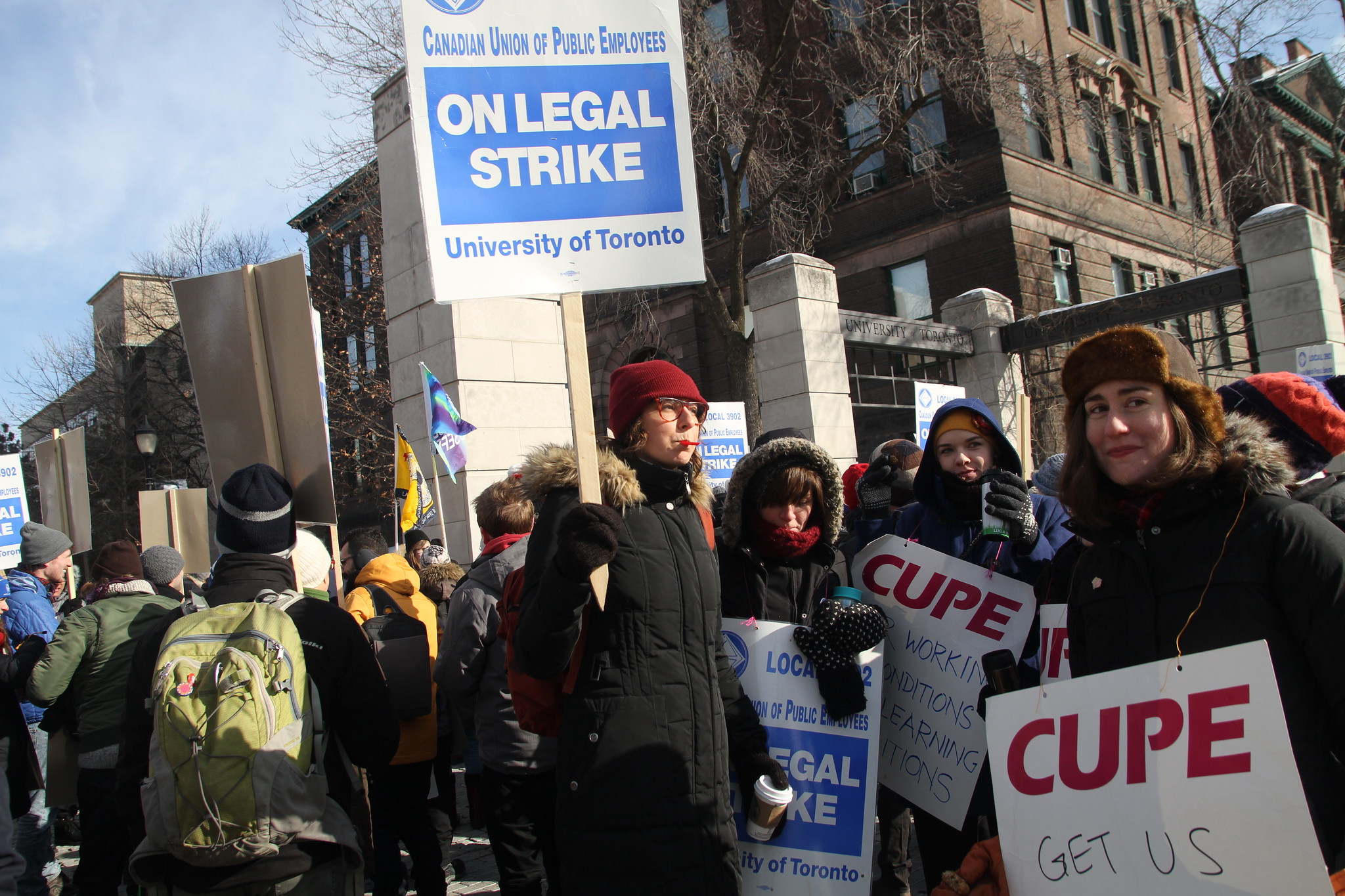Dr. Susan Rosenthal describes the rise of Canada’s public health system during labor’s rebellious postwar period and the corporate profiteering by which it is now being destroyed.

Health care rally in Canada in 2016. (Council of Canadians/Flickr, CC BY-NC-SA 2.0)
By Dr. Susan Rosenthal
SusanRosenthal.com
 Ontario’s Bill 60 has delivered a potential death blow to public Medicare. If it becomes law, the provincial medical system will no longer operate as a public service but as a profit-taking business managed by the private sector.
Ontario’s Bill 60 has delivered a potential death blow to public Medicare. If it becomes law, the provincial medical system will no longer operate as a public service but as a profit-taking business managed by the private sector.
While defenders of public Medicare blame Conservative Premier Doug Ford, British Columbia, Quebec and Saskatchewan are going down the same road.
If we hope to reverse this disaster, we need to know how Canadians won Medicare in the first place, and why they are losing it.
World War II saw a global upsurge of labor protest. Union membership more than doubled in Canada, and the number of strikes tripled. During the early 1940s, one-third of all workers in Canada were on strike. To calm the rise in worker rebellion, governments agreed to fund social programs like Medicare.
At the time, Canada had virtually no public medical system. Doctors charged whatever they pleased and bankruptcy from high medical bills was common.
The Canadian Labour Congress pushed for a comprehensive public medical system available to all. The corporate class pushed back, opposing any government control over medicine. Insurance companies feared losing business. Drug companies feared losing profits. And doctors were horrified at the thought of losing their elite status as independent entrepreneurs.
On July 1, 1962, Saskatchewan launched North America’s first government insurance plan to cover hospital care and doctor visits. That same day, 90 percent of Saskatchewan’s doctors went on strike. The doctors’ strike was deeply unpopular and collapsed after 23 days.
The 1964 federal Royal Commission on Health Services suggested a class compromise. For the working class, it recommended government-funded medical insurance. For the business class, it recommended the right to deliver medical services “free of government control or domination.”
Class Compromise

The Saskatchewan Legislative Building. (Stonedan, CC BY-SA 3.0, Wikimedia Commons)
The business class and the working class have opposite interests. For the working-class, medical care is a human right and a vital necessity. For the business class, healthy profits take priority. This class conflict shapes the quality and accessibility of public programs.
Workers in Canada were strong enough to win public funding for medical care, but not strong enough to kick out the profiteers and win the fully public system they wanted.
The federal Medical Care Act of 1966 was based on class compromise. It established government funding for hospital care and doctors’ visits, while excluding essential medical services such as dentistry, eye care, home care, long-term care and prescriptions. These exclusions enabled insurance companies to continue selling policies to cover such services. (The insurance industry is exempt from human-rights legislation and can legally deny coverage on the basis of a person’s age, past medical history and current state of health.)
Another class compromise was to maintain private-sector control over out-patient care. Doctors were allowed to remain independent contractors charging for each service they provide.
From the start, Canadian Medicare was designed as a two-tier system that gave the private sector room to grow. And grow it did.
Funding Cuts
When Medicare began, Ottawa agreed to pay half the cost of all medical services performed in hospital. This did not last.
In response to the 1970s’ global recession, governments boosted profits by cutting corporate taxes.
Canadian corporations contributed more than half of all tax revenue in the 1950s. Today, they contribute around 12 percent. To offset the loss of corporate revenue, governments cut spending on public programs.
“From the start, Canadian Medicare was designed as a two-tier system that gave the private sector room to grow. And grow it did.”
In 1977, the Trudeau Liberals reduced the federal share of medical funding from 50 percent to 20 percent, forcing the provinces to also reduce their spending. The federal share has varied since then, and currently stands at 22 percent. Less funding for public Medicare enabled private corporations to step in to fill the need.
The 1984 Canada Health Act reassured nervous Canadians that Medicare was safe. Behind the scenes, politicians continued to advance the privatization agenda.
The Drive to Privatize
 Business and government view public-sector spending as a drain on the economy. While public facilities can deliver social services more effectively, this costs money. The same services delivered for profit in the private sector make money, and that is seen as a benefit for the economy.
Business and government view public-sector spending as a drain on the economy. While public facilities can deliver social services more effectively, this costs money. The same services delivered for profit in the private sector make money, and that is seen as a benefit for the economy.
In Caring for Profit (1998), Colleen Fuller documents how plans to open Medicare to the private sector date back to the 1990s’ push to integrate the world economy (“globalization”).
Corporations need a profitable home base on which to grow into global players. Governments provide that base by, among other measures, opening public services to the private sector.
A 1994 Report to the Ontario Ministry of Health advised expanding the domestic for-profit medical industry to help it compete in the global market. The federal government was on the same track. As a 1997 Report for Industry Canada stated, promoting Canadian companies as global health-keepers is the main objective driving the strategies and plans of the government for the medical devices, pharmaceutical and health-services sector.
The Canada Health Act compels government to pay for all medical services provided in hospital. It does not prevent those services from being removed from hospital and handed to the private sector.
Every medical service that can be removed from hospital has been removed or soon will be. The only services left in the public sector will be those too unprofitable to privatize.
Loblaw Companies Ltd. is Canada’s largest food and drug retailer, with more than 2,400 retail outlets across Canada, including its Shoppers Drug Mart subsidiary. Ninety percent of Canadians live within 10 km of one of those outlets, enabling Loblaw to position itself as a major private provider of medical services.
In 2006, Loblaw purchased MediSystem Pharmacy. In 2020, it launched the PC Health app that offers live chats with registered nurses and dietitians. In 2021, it purchased a top chain of physiotherapy clinics. New grocery and pharmacy locations will include clinic spaces and older locations are being retrofitted to offer medical services.
Hospitals themselves are being privatized through Public Private Partnerships (P3s). A P3 hospital is built with public funds and managed by a private corporation. There are more than 50 P3 hospitals across Canada, and the Canadian Council for Public-Private Partnership is pushing for more P3s in medicine, education, transportation and public utilities.
P3s are a prime investment for the private sector. Governments put up the money and take all the risk, while corporations take all the profit. It’s a familiar story: we pay and they profit.
Working Conditions

Doug Ford campaigning in Sudbury during the 2018 Ontario general election. (CC BY-SA 2.0, Wikimedia Commons)
Whenever the private sector take over a public program, we see a consistent pattern of higher cost, lower quality service and deteriorating working conditions. A 2021 report comparing public and private sector workers in Ontario found,
- Workers in the government sector (federal, provincial, and local) earn 11 percent higher wages on average than their private-sector counterparts.
- 84 percent of government workers are covered by a registered pension plan, compared to just 25 percent of private-sector workers.
- Government workers retire about 2.5 years earlier.
- Private sector workers are more than four times more likely to lose their jobs.
Schedule 2 of Bill 60 allows government to reduce spending in the public sector by creating new categories of lesser-skilled, lower-waged medical workers to perform duties currently performed by registered doctors, nurses and medical technicians.
Poor quality working conditions result in poor quality service.
“Governments put up the money and take all the risk, while corporations take all the profit. It’s a familiar story: we pay and they profit.”
For-profit facilities invest the minimum in patient care so they can maximize dividends to shareholders. That is why the Covid death rate in Ontario’s for-profit nursing homes was four times higher than it was in public municipal nursing homes. Yet these same for-profit corporations, who are responsible for the deaths of 4,000 Ontario residents, were granted 30-year licenses and permission to add 18,000 more long-term-care beds.
Burden the Family
Social services distribute the cost of caring across society. Loss of public support for medical care, childcare, home care, disability support and long-term care shifts the burden of care onto unpaid family care-givers, who are mostly women.
Employers generally pay women less because of their family and care-giving responsibilities. When public care is not available, the person with the lowest wage typically stays home to provide it. The result is a vicious circle that traps women in lower-waged jobs and also in the unpaid work of domestic care-giving.
Globally, it would cost $11 trillion annually to provide the socially necessary care that women provide for free in the home. That’s more than triple the size of the world tech industry. The system saves a ton of money, while 42 percent of all women cannot get waged work because of care-giving responsibilities.

British Columbia Family Day 2016. (Province of British Columbia/Flickr, CC BY-NC-ND 2.0)
The increasing loss of public programs is increasing the need for home-care and for women to be home to provide it. Restricting or eliminating access to abortion is one way to do this.
Women rely on abortion care so they can stay in waged work, support their families and leave violent partners. Loss of access to abortion is driving vulnerable women out of waged work and trapping them in the family.
Growing economic reliance on the family is also driving horrific attacks against trans people, gender rebels, drag artists, cross-dressers — any behavior that challenges traditional family and gender roles.
Damage Control, Not Health Care
It used to be that women could get secure, well-paid, union jobs in the medical industry. No longer. In the 1990s, Ontario adopted a cost-saving, “just-in-time” staffing system pioneered by the auto industry.
In Saskatchewan, hospital managers followed nurses around with stopwatches to track and time every movement, from turning around (one second) to checking supply rooms (three seconds).
“The loss of public programs is increasing the need for home-care and for women to be home to provide it. Restricting or eliminating access to abortion is one way to do this.”
Just-in-time staffing relies more on casual workers than on permanent full-time staff. The result is rising costs, more overtime, more stress-related leave and thousands of nurses leaving hospital work.
Just-in-time staffing crippled the ability of hospitals to respond to the 2003 SARS outbreak and the Covid pandemic. Nevertheless, it is still in use, while governments demand even more cost-cutting measures.
Treating staff as replaceable widgets is stirring systemic violence. So is making people wait too long for the care they need, when they get it at all. No wonder patients lash out in desperation.
Hospitals have become dangerous workplaces where staff suffer beatings, sexual assault and racist attacks every day. In British Columbia, incidents of physical violence directed against medical staff more than tripled between 2015 and 2022.
Medical workers are seven times more likely than manufacturing workers and 45 times more likely than construction workers to be injured from violence on the job. Instead of making work safe, managers post signs warning, “abuse towards staff will not be tolerated.”
When cost-cutting results in fatal medical errors, hospitals are never held responsible for creating conditions that raise the risk of such errors. Instead, individual medical workers are blamed and criminally prosecuted.
A system that violates the health of its workers and those they serve should not be called a “health-care” system. It is a system of damage-control. Employers are free to sicken, injure, and kill workers, and the medical system manages the resulting damage.
Backlog
In The Shock Doctrine, the Rise of Disaster Capitalism (2007), Naomi Klein explained how the business class exploit social crises for profit.
While populations are reeling and disoriented, their economies are pillaged in a capitalist feeding frenzy. Public wealth is handed to the private sector and private debt is transferred to the public sector. A few become fabulously wealthy, and the majority are impoverished. By the time the population recovers, the economy has been looted and the theft sanctioned by law.
When the Covid pandemic overwhelmed public hospitals, governments promised to “build back better.” They did not mean better for the majority; they meant better for the profiteers.
 The Ontario government insists that the pandemic-related backlog of more than 200,000 surgeries can be cleared only by doing them in private medical clinics. To promote this transition, the province under-spent its budget on public Medicare and overspent its budget on private clinics.
The Ontario government insists that the pandemic-related backlog of more than 200,000 surgeries can be cleared only by doing them in private medical clinics. To promote this transition, the province under-spent its budget on public Medicare and overspent its budget on private clinics.
The public medical system could easily clear the surgical backlog if it had enough staff. In 2022, 158 emergency rooms in Ontario had to close for lack of staff, and hospital operating rooms remain underused for the same reason.
On a per-capita basis, Ontario has the lowest hospital funding, the fewest hospital beds, and the fewest nurses in the country. Fifteen thousand registered nurses and registered practical nurses have left Ontario because of low wages and abysmal working conditions, including the outrageous demand to work while sick during the pandemic.
The province insists that moving hospital surgeries to private clinics will reduce patient wait times. It will do the opposite.
No one can work in two places at the same time. Pulling medical staff away from public hospitals to work in private clinics will decimate the public system. Any reduction in wait times in the private sector will be offset by even longer wait times in the public sector.
To maximize profits, private clinics will do simple surgeries such as cataracts and hip-and-knee replacements, leaving more difficult, complex surgeries in the public system. When clinic surgeries become complicated, patients will be off-loaded to the public system, along with the cost of treating their complications (assuming patients survive the transfer).
The loss of simple surgeries will devastate small and rural hospitals. Complex surgeries were moved to larger centers some time ago. Without income from simple surgeries, smaller hospitals will have to close, reducing access in already under-served areas.
Private surgical clinics will not produce more family doctors. Last year, more than 2 million Ontarians did not have a family physician, 24 percent more than two years ago. The shortage of family doctors across Canada is predicted to more than double over the next seven years. Overwhelmed with patients, some Ontario doctors are offering rapid access to a nurse practitioner, for $30 a month.
The province says patients will not have to pay out-of-pocket in private facilities, but they will.
The Ontario Health Insurance Plan (OHIP) pays only a base rate. To meet shareholder demands for maximum profit, the province allows private clinics to “upsell” by charging patients a fee for premium or upgraded services. While politicians call this “patient choice,” those who cannot pay will have no choice. Those who can pay will be milked.
The push for maximum profit inevitably leads to fraudulent billing. As the Office of the Auditor General warned, the ministry has no oversight mechanism to prevent patients from being misinformed and being charged inappropriately for publicly funded surgeries.
Finally, the Canada Health Act does not compel government to pay for out-of-hospital care, so public funding will be reduced to the absolute minimum, returning us to pre-Medicare conditions.
Which Way Forward?
How can we stop the profiteers, revitalize public programs and improve working conditions in the public sector?
The Ontario Health Coalition (OHC) is a prominent research and advocacy organization that opposes profit-taking in medicine, lobbies for public Medicare and is mobilizing public opposition to Bill 60.
In 2016, the OHC launched a referendum campaign at 1,000 polling stations in 40 communities across the province. Almost 94,000 people voted, with 99.6 percent demanding that government stop cutting hospital funding and services.
The OHC is launching another referendum campaign to send the government an even stronger message to reject privatization and invest in the public system. Why would this referendum be more effective than the previous one?
Now's when it counts: urgent regional organizing mtngs to stop privatization. Now is the time to move forward on the fightback to save our public hospitals/health care. ??? pic.twitter.com/lIyDguWIsz
— OntarioHealthCoal'n (@OntarioHealthC) March 13, 2023
Politicians already know that the majority want fully funded public services. A 2022 poll revealed that 92 percent of Canadians oppose funding cuts to healthcare, education, and other social programs, and 88 percent favour a wealth tax to fund these programs.
Public mobilization campaigns are based on the assumption that politicians will respond if enough people pressure them to do so. When such campaigns fail, blame is directed at a presumably uncaring or apathetic public, as recently expressed by one OHC representative.
There may not be a great impact as a result of the referendum, but it will inform Canadians who think they’ve got public health care. That Canadians are just unaware, completely zombie-like in their perspective is a grave misunderstanding. After decades of setbacks and defeats, most people feel powerless to improve things at work or in society. Their lives are getting harder, and they see no way forward.
Politicians lie (the Ontario premier campaigned on a promise not to privatize Medicare). Unions have failed to deliver real on-the-job improvements. And past public campaigns have proved ineffective. Discouraged people need a real win, not more campaigns that raise their hopes and deliver defeat.
No Democracy
Democracy literally means rule of the people. If Canadians lived in a democracy, they would have a fully public medical system, because the majority want it. The fact that they do not have such a system proves they do not live in a democracy.
There is no democracy in the economy. The majority get no say over what is produced, how it is produced, and for whom. The result is toxic pollution, deforestation, species extinction and global warming.
There is no democracy in foreign policy. Canadians did not vote to send troops to Haiti to put down a popular rebellion (again). They did not vote for Canada to sell weapons to Saudi Arabia or build military bases around the world. And they certainly did not vote for World War III.
There is no democracy at work. Workers have no say over what they do or how they do it, even though they know best what needs to be done and how to do it well and safely.
There is no democracy when it comes to spending the social surplus. Canadians do not get to vote on whether to invest in war or in the environment, in police or social supports, or in private or public services.
In a democracy, the business class would be forced to share their profits, which have never been higher.
In 2022, the Shell oil company posted a record profit of $40 billion, more than double what it raked in the previous year. Chevron reported a similar record-breaking profit. You could make $53,000 every single day for over 2,000 years and still not have that much. Nevertheless, every year, Canada gives $4.8 billion in subsidies to the fossil-fuel industry.

Shell station in Canada. (Raysonho, CC0, Wikimedia Commons)
Capitalism is the enemy of democracy. Any form of collectivism (prioritizing public need) is considered a threat to private enterprise, because it is. Premier Doug Ford calls government-funded or socialized Medicare “communism” and privatized medicine “freedom” — freedom for the few to profit at the expense of the many,
Capitalist Dictatorship
Modern technology could enable everyone to vote on every issue that affects their lives and society. However, capitalism is based on depriving the majority of what they need, and who would vote for that? To maintain capitalist rule, people are not allowed to vote on anything that might disrupt the flow of profit.
The entire social system is structured to transfer wealth from the working class to the business class. Every human activity is treated as an opportunity for profit-taking.
“We live in an anti-democratic, authoritarian, capitalist dictatorship. The entire social system is structured to transfer wealth from the working class to the business class.”
The dismantling of Medicare can only be understood in this context. Capitalism is based on the conversion of common property into private property. From the 18th century enclosure of common lands, to the current privatization of public services, capitalists strive to transform what belongs to all into what belongs exclusively to them. Their wealth is built on deprivation and their power on subjugation. Their greatest fear is a working-class rebellion that could end their rule.
Class Power
The quality of public programs does not depend on what the majority want or who they vote for but on the balance of class forces, that is, on which class is using its power to make the other back down.
Decision-makers respond to majority demands only when their power is threatened. When workers exercise power on the job, when they make the bosses back down, politicians get scared and deliver pro-worker reforms in hopes of buying labor ‘peace.’
Canada’s first Royal Commission to study government-funded health insurance was launched in 1919, the year of the Winnipeg General Strike.
Britain’s National Health Service (NHS) was established in 1948 to calm a post-war workers’ rebellion. As a Conservative member of the British Parliament warned, “If you don’t give the people reform, they will give you revolution.”
Canada’s Medicare system was consolidated in the context of rising workers’ struggles that peaked in the Quebec General Strike of 1972.

Picket line during the 1972 Québec general strike. (Michel Giroux, CC BY-SA 4.0, Wikimedia Commons)
Since the mid 1970s, the working class have suffered decades of setbacks and defeats, losing much of what they won in the past, including solid union jobs, the 40-hour week, and robust public services.
The more workers retreat, the more the business class push their agenda, regardless of which political party is in office. The process of dismantling Medicare began in the 1970s and has continued under every form of government: Liberal, Conservative, and NDP (social democratic).
Experience shows that the problems created by capitalism cannot be solved by electing different politicians or parties to office. No matter who is in charge, a social system that is structured to exploit humanity and nature for profit cannot be made to do the opposite — promote the well-being of people and the planet.
Social systems are structured to achieve specific goals. The goal of capitalism is capital accumulation, which it does extremely well. The call to prioritize human need is a call to change the goal of society. This is no easy task. A different social goal requires a fundamentally different social system, one that only the international working-class can construct.
All Strikes are Political
All strikes are political battles over what matters more, human need or corporate greed.
Strikes are not merely means by which workers achieve gains in the workplace. Rather, they are moments in the process by which workers constitute themselves as a class — building solidarity, raising class consciousness, creating their own norms and institutions and discovering their own forms of class power. (Class Struggle Unionism, p.59)
When factory workers reject forced overtime, when education workers demand smaller classes, when nurses demand staff-to-patient ratios and when anyone demands higher wages, they are challenging the primacy of profit, the foundation of capitalism.
The outcome of these battles depends on which class uses their power to make the other back down.
The power of the capitalist class lies in their control over social institutions including the legal system, the courts, the police, and the media. However, the power of the working class is greater.
Workers are the vast majority, and nothing moves without their effort. Stopping work stops the flow of profit. When workers stand together, they can defeat the bosses and make governments change course. To keep workers down, the ruling class must block effective strikes.
Governments justify anti-strike legislation by insisting that strikes are not in the public interest. The opposite is true. Business-as-usual is not in the public interest. Successful strikes raise living standards, which is very much in the public interest.
Playing by the enemy’s rules is a sure way to lose a battle. To strike effectively, workers must be willing to violate restrictive labor laws and make them unenforceable.
After launching a solid, 17-day, illegal strike, Canadian postal workers won the legal right to strike in 1965.
That same year, Ontario hospital workers were denied the legal right to strike in order to hold down the wages of a predominately female, immigrant and under-paid workforce. (This same strategy is still used against public-sector workers.)
“Playing by the enemy’s rules is a sure way to lose a battle. To strike effectively, workers must be willing to violate restrictive labor laws and make them unenforceable.”
In 1981, 13,000 hospital workers across Ontario launched an illegal strike to protest wage cuts and degraded working conditions. They held out for nine days against hospital management, the provincial government, the courts, the police, and the media.
Initially, union officials for the Canadian Union of Public Employees (CUPE) opposed the strike. When workers struck anyway, union officials issued a statement of support, but failed to mobilize other CUPE locals to build the strike. Isolated, the strike crumbled in defeat.
Weak Unions

University of Toronto, 2015. (OFL Communications Department/Flickr, CC BY 2.0)
Why do union officials collapse strikes, as CUPE did recently with the education workers, instead of broadening them? Why did the Ontario Federation of Labour (OFL) surrender to wage-busting Bill 124 instead of mounting a mass public-sector strike to force the province to back down?
While union officials vigorously object to the loss of public services, they refuse to organize the class power of workers to make governments reverse course.
Union officials are committed to bargaining with the business class, not challenging their rule. To protect their relationship with the employer, union officials hold workers back, mounting ineffective strikes that typically end in defeat.
Unwilling to do what it takes to deliver real on-the-job improvements, union officials launch toothless public-mobilization campaigns. Instead of leading class rebellions, they pin their hopes on electing a labor-friendly government that will pass pro-labor laws, meaning, make capitalism work in their favor.
These are safe strategies for union officials. Lobbying campaigns make it appear that they are fighting for workers’ rights, without challenging the social order that violates those rights.
For workers, this has been a losing strategy. The social order must be challenged in order to win meaningful reforms.
Centering Work

Pandemic Physician: one of the doctors in Toronto who joined a protest at the conditions of homeless shelters during the Covid pandemic, April 15, 202. (michael_swan/Flickr/CC BY-ND 2.0)
Public-pressure campaigns appeal to all social classes to exert moral pressure on authorities to do the right thing. Such mobilizations can be powerful when linked with workplace battles. In the absence of workplace action, they can only threaten to vote for different politicians or parties. An electoral focus limits what can be achieved to what capitalism allows.
Public Medicare could be rebuilt if hospital workers won good contracts that a) pull money back into the public system and b) improve working conditions to attract and keep qualified staff. They cannot do this on their own, nor should they have to.
The labor movement is based on the principle that an injury to one is an injury to all. When any group of workers is attacked, all are at risk. When any group of workers win, it is easier for the next group to win. Workers have tremendous power when they stand together. Fighting separately is a recipe for defeat.
“Workers have tremendous power when they stand together. Fighting separately is a recipe for defeat.”
To build a fighting labor movement that can win real improvements, workers must be willing to challenge the existing order, including defying anti-worker laws. They must be willing to fight together, as a class. That means all-out support for every strike.
All-out support means public-sector workers striking together: medical, education, library, clerical, postal workers, all together. They all have the same employer – the government!
All-out support means public and private sector workers supporting each others’ strikes, not merely in words, but by swelling picket lines and mounting solidarity strikes. A strike that gains momentum day-after-day is the bosses’ worst nightmare. They will concede whatever they must to prevent a workers’ rebellion from growing beyond their control.
Who Can We Count On?
Covid exposed capitalist priorities for all to see. We saw corporations profit from the pandemic while doing nothing to protect their workers. We saw politicians accept millions of Covid deaths instead of legislating paid sick leave and making schools safe. In contrast, we saw ordinary working people risk their lives and those of their loved ones to serve the public.
Who can we count on to protect our public services? Corporations are not required to protect the public interest. Their only legal obligation is to deliver profits to shareholders.
Politicians will not protect the public when doing so means angering the business class and losing corporate donations.
The only people we can really count on are those who work in public services, because their job conditions directly affect the quality of our services.
Who would you rather manage a hospital? Executives and bureaucrats obsessed with the bottom line? Or medical and support staff who actually do the work? I will take my chance with workers in charge, any day.
It is useless to blame the loss of public Medicare on any particular politician or political party. All over the world, people are facing the same problem — a global capitalist system that values profit over human lives. The profiteers are taking everything away from us, and they will not stop until there is literally nothing left.
Last month, a million people marched in Madrid to protest the dismantling of their public medical system. Tens of thousands of nurses in the U.K. went on strike because they know that quality care cannot be delivered without quality working conditions. And in 2021, half of all strikes in the United States were strikes of medical staff.
Power on the job means power in society. A strong labor movement can win strong public programs. The loss of public programs signals a weak labor movement.
Class struggle won public services like Medicare, and class struggle is the only way to win them back. To succeed, workers must not allow the class enemy to dictate what is and is not acceptable. They must exercise their right to fight effectively, and not back down until they win.
Dr. Susan Rosenthal is the author of several books and most recently, the article, “The Social Sources of Sickness: What I Learned From 50 Years in Medicine.” She can be reached at [email protected] .
This article is from the author’s blog, SusanRosenthal.com.
The views expressed are solely those of the author and may or may not reflect those of Consortium News.


American ‘friendly’ business interests = piranhas in business suits.
Sad, Achingly True, article. I am so fortunate to have an e-mail subscription, or I probably would never have seen it.
I am a unionist and proud to my very soul to be one — a 28-yr. retired librarian from our state’s teachers’ union.
Another article in this particular issue is also excellent — and a dire warning to all U.S. citizens.
I refer to the article on U.S. hegemony vis a vis the New World Order.
I lived during WWII and I remember with respect and thanksgiving how our wonderful our neighbors, the Canadian
ha our ‘back door. Over the years I have visited Quebec and Ontario and was so impressed and grateful for their courtesy
and openness to me.
This is the best thing I ever read out of consortium news. I live in Canada. I depend very much on the Health care system to stay alive and reasonably functional. So I am very concerned about what is going on.
I see other countries in which health care is under attack, where the public is fighting back much more vigorously. In Canada opposition cannot get off the ground. The real problem is deeply rooted in Canadian culture. The “speak truth to power” idea does not work well in the age of neoliberalism.
I am a big blogger and I will do some blogging about this subject.
And I will assist you if I can as I also am very concerned with Canada burning down health care. People are dying far more than they should, are leading lives of endless pain where the system doesn’t care, and there is no discussing changing the system to be a real two tier system versus what we have today. We have lost all sane and sensible leadership in Canada under the Trudeaus (Pierre and even far worse and brainless puppet son Justin, high puppet of the WEF).
Very sad. This story reads like a repeat of what is happening in the UK with the NHS.
The biggest enemy of the peoples in the West appears to be their governments – we need revolution to stop this.
Agree.
“Who Can We Count On?”
1) Look in the mirror.
2) Look who is standing beside you and fighting beside you.
3) Yes, it is a short list … always has been. Even during the successful revolutions, but at least then you could find more people in group #2.
Who can’t you count on …. politicians who say ‘they are on your side’. Especially when they are millionaires, but generally true for all politicians. The worst are the ones who regularly hold press conferences where they claim to be on your side, but actually just serve as a fig leaf for more corporate profiteering.
The only politicians who will fight for you are the ones who come from you, you live next door to you, who work on the same line as you, who was willing to fight alongside you before all of you got together and made this fellow fighter into your politician. That’s the only way you get a politician who is willing to fight for you.
Oh, and it should be obvious, but if you are not placing yourself on the line and fighting for yourself, then it is impossible for anyone to fight beside you. Thus, if you refuse to fight for yourself, at best you can only count on yourself, for what that is worth, since you are not fighting either.
“The business class and the working class have opposite interests.” So true. I wish you’d tell our trade union leaders here in the UK who are happily leading their members into wage cuts and defeats of their courageous strikes. And what does the leader of our only opposition party, the one called Labour, say about this relationship?
“Keir Starmer wants big business to “mold” Labour’s election plans and get its “fingerprints” on his policy agenda and, in a further nod to the business-friendly “New Labour” days of the 1990s and 2000s, he’s even tapping Tony Blair’s moneymen to fund his bid for power. Speaking alongside Blair-era Minister Peter Mandelson at a business roundtable in late January, Starmer said he wanted to “extract as much as I can from you, have a really grown-up conversation, and also for you to see that it is possible to mould, have your fingerprints on what we’re doing,” two people present told POLITICO.”
www(dot)politico.eu/article/keir-starmer-tony-blair-labour-party-wants-business-fingerprints-on-plans-as-moneymen-woo-donors/
As a Canadian I know this story too well. As in the US our political class has completely sold out to the neoliberal corporatist agenda that is sacking the West from top to bottom and where the public has no defenses having been abandoned by politicians.
People in Canada aren’t even aware of the neoliberal ideology and its impact on our societies and it is just one of many destroying us. War and Militarism are two more ideologies turning North America into a ghetto for the impoverished. We are losing the class war with our defenses destroyed and left totally to whims of the neoliberal political/corporate aristocracy that is utterly psychopathic.
It pains me further that I have to read such a report as this on an American journal as our level of censorship is also totally out of control.
I write this as a fully recovered COVID survivor whose stay in hospital and lengthy recovery was only possible through government sponsored medicare. My eternal gratitude goes out to the medical staffs who brought me back to life .
They are, but refused to believe what they don’t read or hear about. Why pay taxes for a system that is imploding from Bay /Wall street down thru politician signed ISDS clauses and lastly cheering media . Just like 2008 and no one stood or said or did, what was obvious, and timidity won and knees stayed bent.
This article is something of a revelation. Canada is often cited as a country where good medical care is affordable and available to all. It looks like the American model of for-profit medicine is fast approaching a takeover north of the border. Canadians need to take a good look at the prospect of limited access to health care and medical bankruptcies, which are half of all bankruptcies in the US. Soaring profits for health insurance and pharmaceutical corporations come at a price to every citizen. Even non-profits such as Kaiser bare scrutiny: executive salaries are in the millions.
The bigger question is, Why do we tolerate this? The private sector is immensely well-funded, and they are able to propagate fears in the public that Medicare for All is just a prelude to all of us living on collectivist farms. “Socialism” is the great Satan. Never mind the mind-boggling “socialist” subsidies that go to the private sector, across the economic spectrum. One egregious example is Moderna, developing a Covid vaccine largely through research done in the public domain. Now they have 5 billionaires in their executive suites. The propaganda is very effective. Witness some of the poorest US states, such as West Virginia and Kentucky, re-electing people like Manchin and McConnell, year after year, who do their very best to keep their electorate in the poor house. As long as people are willing to stay locked into a system of deplorable, dumbed-down education, vapid television “entertainment,” and Tik Tok, we will continue to be subjected to this evisceration by the ruling elite. And re-electing Joe-The Working Class Hero-Biden won’t change much, if anything, to reverse the course.
What’s the problem here? We need to make health care a fully private system. How else can we make progress with medical technology if we don’t have a strong profit motive? (Don’t tell anyone that most medical and scientific innovations are publicly funded.)
If you can’t afford US-style, over priced “health care” extortion, then you don’t deserve health care. If you die 10 years before the average because you aren’t wealthy (like in the USA) due to lack of adequate health care, don’t take it personal, it’s strictly business.
You can buy stocks in the insurance companies, BigPharma, and invest with private equity firms like BlackRock to get in on the action.
That way we can have a stockholder/stakeholder society. Can’t afford to invest? Then you must be stupid, lazy, or both and perhaps deserve to die younger than the wealthy
Wow! That is the most repugnant thing I have read in as long, long time.
Good, it was supposed to be. You didn’t detect any sarcasm?
No. Not at all. You sounded too much like a bona-fide nutjob. Or, sometimes I take things too seriously. You decide.
Not funny.
I think it was satire/sarcasm. (Eh Jonny?)
Bitter sarcasm indeed.
Did you forget the sarc tag or are you a useful idiot?
Tough crowd. By putting US-style “health care” in quotes and calling it extortion you didn’t get a clue? “Nothing personal, strictly business” is a line from the Godfather, btw The Mafia is more honest than our political and corporate officials
The complete capitulation of the top labor misleaders in the USA is on display. The fact that the AFL-CIO has reduced themselves to carnival barkers selling Medicare Advantage insurance plans needs unrelenting criticism. Medicare in the USA was created because the insurance industry didn’t see enough profit in seniors. History shows that a revival today is not only necessary but possible. A new direction for labor based on class struggle is needed.
hxxps://www.counterpunch.org/2022/12/13/labor-leaders-provide-cover-for-privatization-of-medicare/
nationalsinglepayer.com
Remarkably consistent. The more a country embraces the US led “liberal order,” the less democracy it has. The public is the rightful protagonist and leader of a democratic society. Not in a US style democracy though. Congratulations Canada and welcome to the fold. It does not get better. You have purchased a one way ticket to worse.
Decent health systems and benefit safety nets were set up or strengthened in the UK and other places just after the end of WW2 largely because there were hundreds of thousands of working class men, trained and experienced in arms, returning from war and expecting fair treatment for themselves and their families, especially if they were disabled as a result of their service. So the governments dared not do nothing. Labour governments got in for the short term in a few places, and got the job done. But it has been a latent target almost from day 1 and an active one since the 1980s, when the real economic and social destruction of the West was put into action by its own governments.
I am a Canadian, and I do not agree with your analysis. My observation is that this is not a right vs left issue, or a public vs capitalist issue, but rather a HUMAN vs Bureaucracy issue. Centralization of Power in anyone’s hands is not good for the vast majority of people. Our Medical Bureaucracy has become an out of control money pit. There is no accountability in the system, and incompetency is rewarded. Those who are a part of the system are focused on maintaining their positions and incomes, not on delivering service to the citizens of the country. They have ideological blinders that prevent reform of any kind. There is no easy way out of this fix, as the focus on dividing up the loot (otherwise known as the public purse) and not on providing services to patients. Blaming this on capitalism is simply wrong, as the bureaucracy does not care if they are socialist or capitalist as long as the $$ keep flowing to them.
I am also Canadian and recognize some of the faults you mention, but I believe that it is likely I would not be alive today, at 85, without our medical system.
Many decades ago I felt abdominal pains and went to the university physician who diagnosed appendicitis. I drove to the nearest hospital and the diagnosis was confirmed. They operated and a few days later I drove home. With a voucher I didn’t have to pay for parking. (It’s unlikely that would be true today.) I don’t remember having to pay anything. Had I been faced with U.S.-style hospital costs I might have been hesitant about going there so quickly.
A little over 20 years ago I had a bicycle accident and had a very strange feeling. I took a taxi to the hospital, and when they took my blood pressure there was immediate consternation. A CAT-scan showed no brain injury, but when I showed pain getting off the gurney I was taken for ultrasound. I still remember the words of the teaching physician explaining to students that they were looking at drops of blood. Then I had to answer a lot of questions about my general health. I was a non-smoker and at the time I was swimming a mile or so several times a week. Three physicians discussed what to do. I was on blood thinners (warfarin) for atrial fibrillation. They decided that the risk of operating (spleen removal) would be greater than that of not operating. The internal medicine doctor very tactfully told me I had “a slight tear” in the spleen. I was thankful in retrospect that he did not use the word “rupture.” The result was that as my spleen bled my abdomen swelled to the size almost of a basketball, and breaths became shorter and more painful. I would rate the pain as 10 out of 10. Heart failure and a ventilator followed, and then came the turnaround when I could leave the ventilator. Altogether I spent a week in emergency care.
Imagine what a U.S. hospital would charge! I would have been reluctant to go to the hospital in the first place.
More recently, I had keyhole surgery to remove a gall bladder, not having to worry about cost, but having a great improvement in health.
This has been followed by treatment (successfully) for venous insufficiency in my legs, reducing the chance of stroke.
In sum, I don’t believe I would be alive today if I were in the U.S. medical system. There are many others who feel strongly in favour of the medical system in Canada. Any politician who attempts to diminish the benefits does so at his or her peril.
The public bureaucracy may act to preserve cushy jobs, but the real money is in privatization. And the decision-makers are in government, currently run by Trudeau neo-Liberals federally (especially right-wing hawk Chrystia Freeland) and Republican-modelled Conservatives in Ontario, both backed by corporations and wealthy cronies.
Ineffeciency in Canada’s system is built it, as Rosenthal points out, by the balkanization of fee-for-services that opens the door to profit. We’ve never had a truly public system; it looks good only in comparison to the American medical wild west. Medical profiteers have been chipping away at the public domain for decades, and are now taking increasingly larger chunks. Ontario’s Republican/Conservative government recently made this blatant, by planning to pay private operators 20% more for surgeries than it pays public hospitals for the same surgeries.
Treating health as a for-profit business clearly reveals an ideological divide. From its founding in Canada by social democrats, the public system has been defended by unions and the left, while corporations consistently eat at it, enabled by right-wing politicians.
The ideal, of course, is a community-based system of clinics and regional hospitals with well-paid staff on salary (not fee for service). Cuba has a good model, even though it’s starved for funds, as do other progressive countries.
I have heart disease. I am suppose to be on medication for that ‘ailment’. However, living in Victoria, BC, I find the only way to get a GP is to be over 70, or pregnant, and ideally both to guarantee a dr. appointment. In other words, because I cannot find a doctor to re-up my script, I must rely on scotch to thin the blood, and pot to lower the blood pressure.
Canada’s healthcare system is falling apart.
But bombs and ammo and other war-toys are sent to the Ukraine – solely for the Ukrainian vote here in Canada – but Canadians can eat cake. I used to be very proud to be a Canadian. Not anymore.
I live where you live and I have no physician either (70yrs). But my heart medicine is available through the specialist that was assigned to me after my heart attack last year. If you have no doctor, you can go to a walk-in clinic and though you will have a wait, you will be seen and a doctor will research your case and advise you. If not, go to emergency and tell them and they will find your records and will prescribe you the medicine you need. I am sorry to say that it seems like you wish to complain, but will not help yourself by seeking the aid you will certainly get with a little patience. Put the scotch down and seek life that will allow you to enjoy the scotch rather than use it to self medicate. BTW, take ASA 81mg to thin your blood – it’s on the shelves with the other pain killers.
You seem to want to criticize without knowing all the facts. I have on several occasions to visit the walk-ins, however on the last four attempts 2 resulted in signage that said “closed due to doctor shortage.” Then they went to online appts. So I made one. I got a call two weeks later saying that I had to choose another doctor because I wasn’t a patient of the one doctor available when I booked. I tried to get my heart specialist to write the script however her secretary/receptionist said that “the doctor doesn’t do that. she is a specialist and has no time for prescription writing. Lastly, if the emergency dept is your go-to, then you absolutely cannot tell me the system isn’t broken.
You would do well to be a little less sanctimonious.
Brilliant article!
To which I would like to add something. When you write “a fundamentally different social system” you are talking about socialism, but when you add “one that only the international working-class can construct” you are ignoring other oppressed classes. Why not write “the international toiling classes”, which would include “campesinos”?
The reason I’m saying this is that the capitalist/imperialist world-system exploits — and simply robs — the “Global South” to a much greater extent than it does the typical worker in the “Global North”. This imperialism has long been cited as one reason for the relative quiescence of “Northern workers”, and I believe that if it is not overcome, there is no hope for socialism. It follows in particular that those exploited classes who predominate in much of the “South” must be part of the struggle if it is to succeed.
Trust me Canucks, you do not want to come anywhere near what we have here in the U.S.
Despite all the propaganda you may hear coming from our health-industrial-complex — our healthcare “system” is a friggin’ nightmare. Stay away! We have people dying after living decades of their lives in massive healthcare debt, living lives of debt bondage bc they had the unmitigated audacity to get sick or injured. We have people dying bc they can’t afford the care they desperately need.
We have fellow citizens getting their wages garnished for life, big chunks taken away right off the bat, for having the temerity to be in poor health. We have people getting divorced and committing suicide bc of the exorbitant costs of our healthcare. And don’t get me started on common working people having to shell out thousands of dollars for a root canal or a crown, forget about it!
But just worry about trans rights, funding Ukie Russophobes, and Soros’ ID politics obsessed BLM.